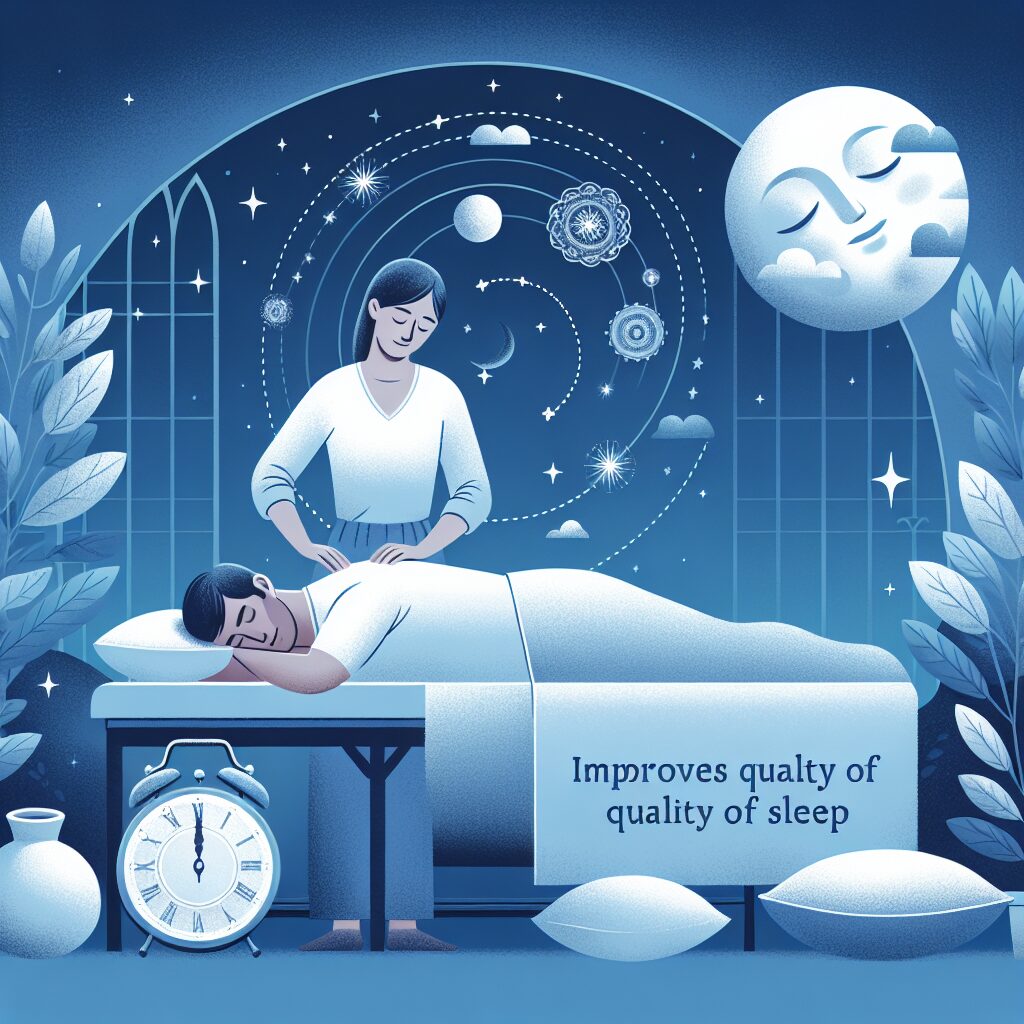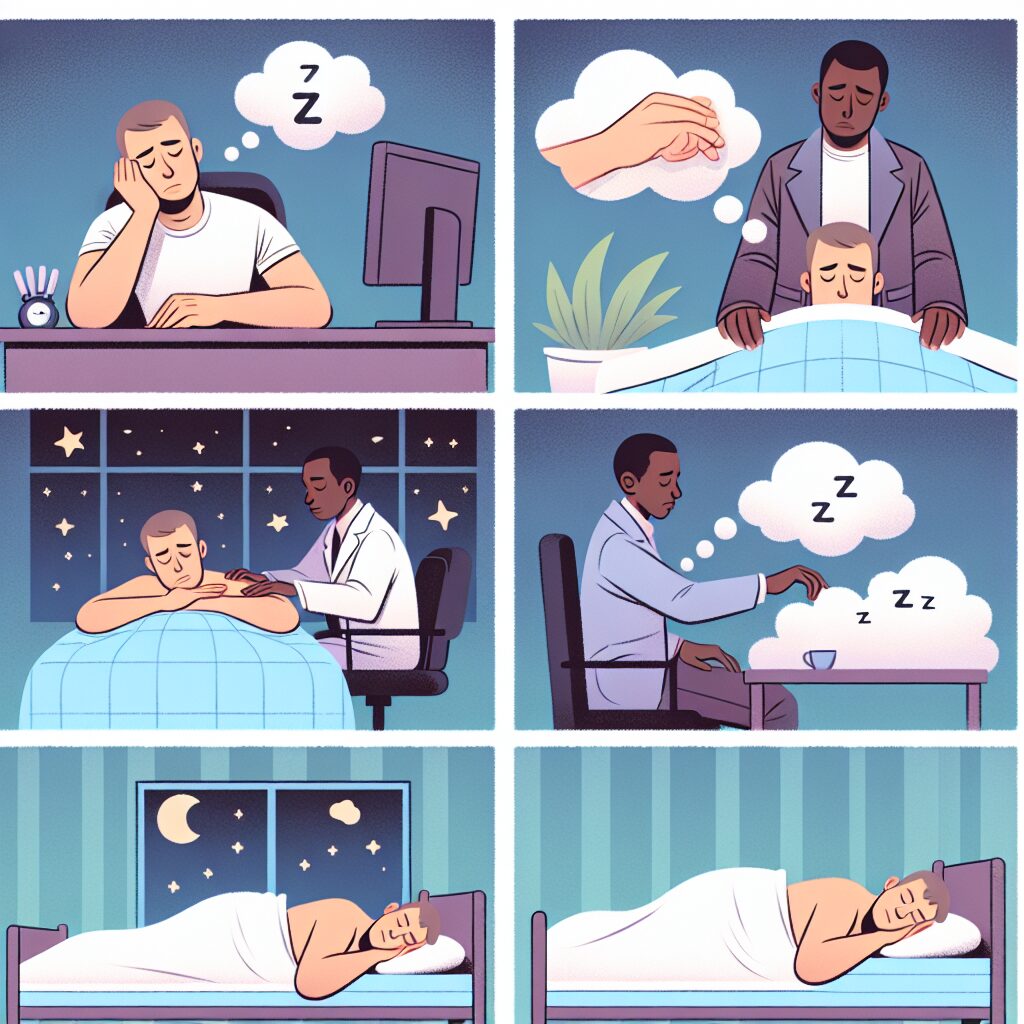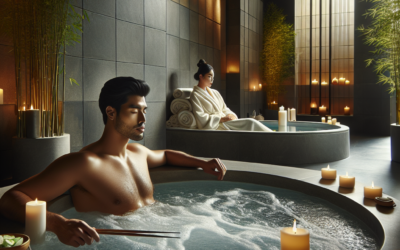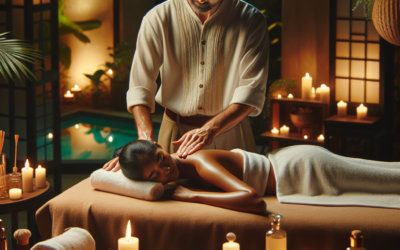Table of Contents
Introduction
Massage therapy can significantly enhance the quality of sleep by promoting relaxation and reducing stress. It works by stimulating the parasympathetic nervous system, which helps the body enter a state of rest and recovery. This relaxation response not only eases muscle tension but also lowers heart rate, blood pressure, and stimulates the release of serotonin, a precursor to the production of melatonin, the body’s sleep-regulating hormone. By addressing physical discomfort, reducing anxiety, and creating a calming effect, massage therapy can improve sleep patterns, making it easier to fall asleep and stay asleep, leading to more restorative sleep cycles. Regular massage sessions have been shown to help with insomnia and other sleep disorders, contributing to overall well-being and better health.
The Role of Massage Therapy in Enhancing REM Sleep
The Role of Massage Therapy in Enhancing REM Sleep
In the quest for a restful night’s sleep, individuals often explore various remedies, from dietary adjustments to pharmaceutical aids. However, one therapeutic intervention that has garnered attention for its potential to enhance sleep quality is massage therapy. This ancient practice, which manipulates the body’s soft tissues, has been shown to have a profound impact on the quality of sleep, particularly in the realm of Rapid Eye Movement (REM) sleep, a critical phase of the sleep cycle associated with dreaming and memory consolidation.
The connection between massage therapy and improved sleep arises from its ability to promote relaxation and reduce stress. Stress is a common culprit behind sleep disturbances, as it triggers the production of cortisol, a hormone that can interfere with the sleep cycle. By mitigating stress and its physiological consequences, massage therapy can set the stage for a more restful slumber. The soothing strokes and pressure applied during a massage session stimulate the production of serotonin, a neurotransmitter that serves as a precursor to the sleep hormone melatonin. Elevated levels of serotonin in the body can facilitate the onset of sleep and improve its overall quality.
Moreover, massage therapy has been found to have a direct influence on the body’s autonomic nervous system, which regulates functions such as heart rate and blood pressure. By inducing a state of relaxation, massage can shift the balance from the sympathetic nervous system, which governs the body’s fight-or-flight response, to the parasympathetic nervous system, which oversees rest and digestion. This transition is conducive to a more peaceful sleep, allowing the body to enter and maintain the REM stage more effectively.
REM sleep is particularly important because it is during this phase that the brain processes and consolidates memories, sorts through the day’s experiences, and rejuvenates cognitive functions. A deficiency in REM sleep can lead to decreased cognitive performance, mood disturbances, and an overall decline in health. By enhancing the quality and duration of REM sleep, massage therapy can contribute to improved mental clarity, emotional stability, and a stronger immune system.
Furthermore, massage therapy’s impact on REM sleep is not only immediate but can also have long-term benefits. Regular massage sessions have been associated with sustained improvements in sleep patterns, suggesting that the therapy’s effects on the body’s stress response and serotonin levels can build over time. This cumulative effect can lead to a more consistent sleep schedule and a reduction in sleep-related issues such as insomnia.
In addition to its direct effects on the nervous system and hormone production, massage therapy can also alleviate physical discomfort that may interfere with sleep. For instance, chronic pain conditions such as arthritis or back pain can make it difficult to find a comfortable sleeping position, leading to frequent awakenings and reduced sleep quality. By addressing the underlying tension and pain in the muscles and joints, massage can help individuals find relief and enjoy uninterrupted sleep.
In conclusion, massage therapy emerges as a valuable ally in the pursuit of quality sleep, particularly in enhancing the crucial REM stage. Its ability to reduce stress, balance the nervous system, and alleviate physical discomfort creates an optimal environment for the body to rest and rejuvenate. As research continues to shed light on the intricate relationship between massage therapy and sleep, individuals seeking a natural and holistic approach to improving their sleep may find solace in the healing touch of massage.
How Regular Massage Sessions Can Reduce Insomnia Symptoms
The quest for a good night’s sleep is a universal pursuit, with countless individuals seeking remedies for the elusive restorative slumber. Amidst the myriad of solutions, massage therapy emerges as a promising avenue for enhancing sleep quality. This therapeutic practice, often associated with relaxation and stress relief, has been found to have a profound impact on sleep patterns, particularly for those grappling with insomnia symptoms.
Insomnia, characterized by difficulty falling or staying asleep, affects a significant portion of the population, leading to a cascade of daytime consequences such as fatigue, irritability, and decreased cognitive function. The relationship between massage therapy and sleep is rooted in the body’s response to stress. Chronic stress can lead to a hyperarousal state, disrupting the balance of the sleep-wake cycle and making it challenging to achieve restful sleep. Massage therapy, through its ability to reduce stress and promote relaxation, can mitigate this hyperarousal, thereby fostering an environment conducive to sleep.
The mechanisms by which massage exerts its sleep-promoting effects are multifaceted. One of the primary pathways is the reduction of cortisol, the stress hormone, which is known to interfere with sleep. By lowering cortisol levels, massage can help normalize the body’s stress response, allowing for a more peaceful transition to sleep. Additionally, massage therapy stimulates the production of serotonin, a neurotransmitter that serves as a precursor to melatonin, the hormone responsible for regulating sleep patterns. An increase in serotonin levels can therefore enhance the body’s ability to modulate sleep effectively.
Moreover, massage therapy can address physical discomfort, which is often a barrier to restful sleep. Muscle tension and pain can make it difficult to find a comfortable sleeping position, leading to frequent awakenings and a reduction in sleep quality. Through techniques that target tight muscles and trigger points, massage can alleviate discomfort, enabling the body to relax fully and enter deeper stages of sleep.
Regular massage sessions have been shown to have a cumulative effect on sleep quality. Over time, the body begins to associate the relaxation induced by massage with a readiness for sleep, creating a positive feedback loop. This conditioning can help individuals establish a more consistent sleep routine, further reinforcing healthy sleep habits. The benefits of improved sleep extend beyond the immediate effects on insomnia symptoms. Adequate sleep is essential for overall health, playing a critical role in immune function, metabolism, memory consolidation, and emotional regulation.
It is important to note that while massage therapy can be a valuable tool in improving sleep, it should be integrated into a comprehensive approach to sleep hygiene. Factors such as a comfortable sleep environment, a consistent sleep schedule, and avoidance of stimulants before bedtime are also crucial components of a strategy to combat insomnia.
In conclusion, massage therapy offers a natural and non-pharmacological option for those seeking to enhance their sleep quality. By reducing stress, easing physical discomfort, and promoting relaxation, regular massage sessions can significantly reduce insomnia symptoms and contribute to a more restful and rejuvenating sleep experience. As research continues to shed light on the intricate connections between massage and sleep, individuals are encouraged to explore this therapeutic modality as a means to achieve the profound benefits of a good night’s rest.
The Impact of Massage on Sleep Quality for Chronic Pain Sufferers

Massage therapy has long been recognized for its ability to alleviate pain and induce relaxation, but its impact on sleep quality, particularly for those suffering from chronic pain, is an area of increasing interest and importance. Chronic pain, a condition affecting millions worldwide, often disrupts normal sleep patterns, leading to a vicious cycle where poor sleep exacerbates pain, which in turn leads to even more sleep disturbances. However, emerging evidence suggests that massage therapy can serve as a powerful tool in breaking this cycle, offering a non-pharmacological approach to improving sleep quality and overall well-being.
The relationship between chronic pain and sleep is complex and bidirectional. Pain can make it difficult to find a comfortable sleeping position, delay the onset of sleep, and cause frequent awakenings throughout the night. Conversely, inadequate sleep can lower the pain threshold, making individuals more sensitive to pain. This interplay creates a challenging scenario for chronic pain sufferers, who often find themselves trapped in a state of constant fatigue and discomfort.
Massage therapy, with its soothing and therapeutic effects, can play a pivotal role in addressing this issue. By promoting relaxation and reducing muscle tension, massage can help ease the physical discomfort that often hinders sleep. The manipulation of soft tissues during a massage session increases blood flow and warmth, which can help to soothe sore muscles and joints, providing a sense of relief that may make it easier to fall asleep and stay asleep.
Moreover, massage therapy has been shown to influence the body’s production of certain hormones and neurotransmitters that are directly related to sleep. For instance, massage can reduce levels of cortisol, the stress hormone, which if elevated, can lead to restlessness and insomnia. Simultaneously, it can increase the production of serotonin, a precursor to melatonin, the hormone responsible for regulating sleep-wake cycles. By fostering a hormonal environment conducive to rest, massage therapy can help recalibrate the body’s internal clock, leading to more consistent and restorative sleep patterns.
For chronic pain sufferers, the psychological benefits of massage should not be underestimated. The experience of receiving a massage can be deeply relaxing, not just physically but also mentally. It provides an opportunity to disconnect from the stresses and stimuli of daily life, which can be particularly beneficial before bedtime. This mental unwinding can make it easier for individuals to transition into a state of restfulness, preparing the mind for sleep.
Furthermore, the regular inclusion of massage therapy in a pain management regimen can lead to cumulative benefits. Over time, as the body begins to associate massage sessions with pain relief and relaxation, the mere anticipation of a massage can start to trigger a relaxation response. This conditioning can make it easier for chronic pain sufferers to manage their symptoms and may lead to more consistent improvements in sleep quality.
In conclusion, massage therapy offers a multifaceted approach to improving sleep quality for those living with chronic pain. By addressing both the physical and psychological aspects of pain and relaxation, it can help to ease the discomfort that disrupts sleep, regulate sleep-related hormones, and provide a calming experience that prepares the body and mind for rest. As research continues to shed light on the benefits of massage therapy, it stands as a promising, natural intervention for enhancing the sleep and overall quality of life for chronic pain sufferers.
Massage Techniques That Promote Relaxation and Better Sleep Patterns
Massage therapy has long been recognized for its therapeutic benefits, including pain relief, stress reduction, and improved circulation. However, one of the most significant yet often overlooked advantages of massage therapy is its ability to enhance the quality of sleep. In a world where sleep disorders and chronic insomnia are increasingly prevalent, understanding how massage techniques can foster relaxation and promote better sleep patterns is essential.
The connection between massage therapy and sleep improvement is rooted in the body’s response to touch and relaxation. When a person receives a massage, the body releases endorphins, which are natural chemicals that generate a sense of well-being and reduce the perception of pain. Simultaneously, massage therapy can decrease the levels of cortisol, a stress hormone, thereby alleviating anxiety and creating a more conducive state for rest.
Moreover, massage therapy can directly influence the body’s parasympathetic nervous system, which is responsible for the body’s rest and digest functions. By activating this system, massage encourages the body to enter a state of deep relaxation and recovery, which is ideal for a restful night’s sleep. The techniques used in massage, such as long strokes, kneading, and gentle pressure, help to soothe tense muscles and release knots, further contributing to a state of physical ease that is conducive to sleep.
One of the most effective massage techniques for improving sleep is Swedish massage. This method is known for its gentle, flowing strokes that promote relaxation and increase the flow of oxygen in the blood. The rhythmic pressure not only eases muscle tension but also helps to quiet the mind, allowing for a smoother transition into sleep. Additionally, the use of essential oils with calming properties, such as lavender or chamomile, during a Swedish massage can enhance the sleep-inducing effects through aromatherapy.
Another technique that has shown promise in improving sleep patterns is reflexology. This practice involves applying pressure to specific points on the feet, hands, or ears that correspond to different body organs and systems. Reflexology can help to balance the body’s functions and promote a sense of tranquility, which may lead to more restorative sleep.
Deep tissue massage is also beneficial for those who suffer from sleep disturbances due to chronic pain. By targeting the deeper layers of muscle and connective tissue, deep tissue massage can alleviate pain that might otherwise interfere with sleep. While this technique is more intense, it can provide long-lasting relief that makes it easier to find comfort and relaxation at bedtime.
For individuals experiencing insomnia or other sleep-related issues, incorporating regular massage therapy sessions into their routine can be a game-changer. It is important to note that while massage can be a powerful tool for enhancing sleep quality, it should be part of a holistic approach that includes good sleep hygiene practices, such as maintaining a consistent sleep schedule, creating a comfortable sleep environment, and avoiding stimulants before bedtime.
In conclusion, massage therapy offers a natural and effective way to improve sleep quality. Through various techniques that promote relaxation and address the physical contributors to sleeplessness, individuals can experience deeper, more restful sleep. By integrating massage therapy into one’s wellness regimen, it is possible to not only enhance sleep but also improve overall health and well-being. As research continues to shed light on the benefits of massage for sleep, it becomes increasingly clear that this ancient practice holds modern-day keys to unlocking a night of better rest.
The Connection Between Stress Relief Through Massage and Improved Sleep
Title: How Massage Therapy Can Improve Your Quality of Sleep
The quest for a good night’s sleep is a universal pursuit, with countless individuals seeking remedies for their restlessness. Amidst the myriad of solutions, massage therapy emerges as a beacon of hope, offering not just physical relaxation but also a pathway to improved sleep quality. The intricate connection between stress relief through massage and enhanced slumber is a topic that warrants exploration, as understanding this relationship can unlock the door to more restorative nights.
Stress, a prevalent affliction in modern society, is a well-known antagonist of sleep. The body’s response to stress is to produce hormones like cortisol, which can lead to a heightened state of alertness, making it difficult to unwind and drift off to sleep. Massage therapy intervenes by activating the parasympathetic nervous system, which counteracts the body’s stress response. This activation induces a state of calm, allowing the body to transition into a more peaceful and sleep-conducive mode.
The benefits of massage therapy extend beyond the immediate relaxation experienced during the session. The manipulation of muscles and soft tissues during a massage can alleviate physical discomfort that often hinders sleep. For instance, chronic pain sufferers may find it challenging to find a comfortable sleeping position, leading to frequent awakenings or difficulty falling asleep. By addressing these underlying tensions and promoting healing, massage therapy can reduce pain levels and thus remove a significant barrier to restful sleep.
Moreover, massage therapy has been shown to increase the production of serotonin, a neurotransmitter that plays a pivotal role in the regulation of sleep. Serotonin serves as a precursor to melatonin, the hormone directly responsible for sleep-wake cycles. By elevating serotonin levels, massage can indirectly boost melatonin production, thereby aligning the body’s internal clock and facilitating easier transitions into sleep.
The rhythmic strokes and pressure applied during a massage mimic the body’s own natural soothing mechanisms, such as the gentle rocking that lulls a baby to sleep. This sensory experience can signal the brain to slow down and prepare for rest, creating an ideal mental environment for sleep. The psychological impact of massage therapy should not be underestimated, as it can help to clear the mind of the day’s worries and stressors, making it easier to fall asleep and stay asleep throughout the night.
Furthermore, the regular incorporation of massage therapy into one’s routine can establish a pattern of relaxation that the body begins to associate with sleep. Over time, this can lead to more consistent sleep patterns and improved sleep quality. Individuals who maintain a regular massage schedule often report not only falling asleep faster but also experiencing deeper, more uninterrupted sleep.
In conclusion, the connection between stress relief through massage and improved sleep is both profound and multifaceted. By addressing the physical manifestations of stress, promoting the release of sleep-regulating neurotransmitters, and creating a ritualistic relaxation response, massage therapy stands as a powerful ally in the pursuit of better sleep. For those who struggle with sleep disturbances, incorporating massage therapy into their wellness routine may be the key to unlocking the rejuvenating power of a good night’s rest. As research continues to shed light on this connection, the role of massage therapy in sleep enhancement becomes increasingly clear, offering a natural and holistic approach to achieving the rest we all so deeply crave.
The Benefits of Massage Therapy for Sleep Apnea Patients
Massage therapy has long been recognized for its therapeutic benefits, including stress reduction, pain relief, and muscle relaxation. However, its potential to improve sleep quality, particularly for individuals suffering from sleep apnea, is an area that has garnered increasing attention. Sleep apnea, a disorder characterized by pauses in breathing or periods of shallow breathing during sleep, can significantly disrupt sleep patterns and lead to a host of health issues. Fortunately, massage therapy emerges as a promising adjunctive treatment that can enhance the quality of sleep for patients grappling with this condition.
The connection between massage therapy and improved sleep is rooted in the practice’s ability to promote relaxation and reduce stress. By stimulating the parasympathetic nervous system, massage encourages the body to enter a state of rest and recovery. This is particularly beneficial for sleep apnea patients, whose sleep is frequently interrupted. The relaxation induced by massage can lead to longer periods of uninterrupted sleep, which is crucial for the body’s healing processes and for maintaining the balance of various physiological functions.
Moreover, massage therapy can help alleviate some of the discomforts associated with sleep apnea. For instance, the condition is often linked with muscle tension, particularly in the neck and upper back, which can exacerbate breathing difficulties. Through targeted techniques, massage can relieve this tension, potentially reducing the severity of sleep apnea episodes. By improving muscle tone and promoting better alignment, massage therapy can also open up the airways, further aiding in the reduction of sleep disruptions.
Another significant benefit of massage therapy for sleep apnea patients is its impact on stress and anxiety levels. Sleep apnea can lead to heightened stress due to the fear of sleep itself, as patients are often anxious about experiencing apnea episodes. This anxiety can create a vicious cycle, where stress leads to poor sleep, which in turn increases stress levels. Massage therapy can break this cycle by lowering cortisol, the body’s primary stress hormone, and increasing serotonin and dopamine levels, which are neurotransmitters that promote feelings of well-being and relaxation.
Furthermore, the improvement in sleep quality through massage therapy can have a ripple effect on overall health. Better sleep can lead to improved cognitive function, mood regulation, and immune system performance. For sleep apnea patients, these benefits are particularly important, as they often suffer from daytime fatigue and concentration difficulties due to their disrupted sleep patterns. By enhancing sleep quality, massage therapy can help mitigate these issues, leading to a better quality of life.
In conclusion, massage therapy offers a non-invasive and holistic approach to improving sleep quality for individuals with sleep apnea. By promoting relaxation, reducing muscle tension, and alleviating stress and anxiety, massage can help patients achieve longer, more restful periods of sleep. As part of a comprehensive treatment plan, massage therapy can be a valuable tool in managing sleep apnea and its associated symptoms, ultimately enhancing the well-being and daily functioning of those affected by this sleep disorder. While further research is needed to fully understand the mechanisms behind massage therapy’s effects on sleep apnea, the existing evidence suggests that it holds significant promise as a complementary treatment option.
How Massage Can Regulate Sleep Hormones Like Melatonin and Serotonin
Massage therapy has long been recognized for its ability to alleviate pain, reduce stress, and enhance overall well-being. However, its impact on sleep quality is an area that has garnered increasing attention from both the medical community and those struggling with sleep disorders. By understanding how massage can regulate sleep hormones such as melatonin and serotonin, individuals may unlock the potential for a more restful and restorative night’s sleep.
Melatonin, often referred to as the “sleep hormone,” plays a crucial role in regulating the body’s circadian rhythm, which is the internal clock that dictates when we feel awake and when we feel sleepy. The production of melatonin is influenced by light exposure; levels typically rise in the evening as it gets dark, signaling to the body that it is time to prepare for sleep. Conversely, serotonin, a neurotransmitter that contributes to feelings of well-being and happiness, is also integral to the sleep process as it is a precursor to melatonin. Serotonin is synthesized from the amino acid tryptophan and is converted into melatonin in the pineal gland.
Massage therapy can have a profound effect on the regulation of these hormones, thereby improving sleep quality. Through the application of pressure and manipulation of soft tissues, massage can help to reduce cortisol levels, a hormone associated with stress. Elevated cortisol levels can interfere with the production of melatonin, thus disrupting the sleep-wake cycle. By lowering cortisol, massage can create a more conducive environment for the natural rise of melatonin levels in the evening.
Furthermore, massage therapy can increase the availability of serotonin by promoting relaxation and reducing stress. The calming effect of massage can enhance the body’s ability to produce and utilize serotonin, which in turn supports the synthesis of melatonin. This cascade of hormonal changes is essential for initiating and maintaining a deep, restful sleep.
The benefits of massage on sleep are not solely hormonal; they also include physical relaxation and pain relief. Tense muscles and chronic pain can be significant barriers to falling asleep or staying asleep. Massage helps to alleviate muscle tension and reduce pain perception, which can lead to a more comfortable and uninterrupted sleep. As the body relaxes physically, it becomes easier for the mind to follow suit, paving the way for a peaceful night’s rest.
Additionally, the psychological impact of massage should not be underestimated. The soothing touch of a skilled therapist can provide a sense of comfort and safety, which is conducive to relaxation. This psychological relaxation can further enhance the body’s ability to transition into sleep, as a calm mind is less likely to be preoccupied with the worries and anxieties that can often keep us awake at night.
In conclusion, massage therapy offers a multifaceted approach to improving sleep quality by regulating sleep hormones like melatonin and serotonin, reducing stress and cortisol levels, relieving physical discomfort, and promoting psychological relaxation. For those seeking a natural and holistic method to enhance their sleep, incorporating regular massage sessions into their wellness routine may provide significant benefits. As research continues to shed light on the intricate relationship between massage and sleep, individuals may find that this ancient practice holds the key to unlocking a night of deeper, more restorative slumber.
The Effectiveness of Massage in Treating Sleep Disorders Linked to Anxiety
Title: How Massage Therapy Can Improve Your Quality of Sleep
The quest for a good night’s sleep is a universal pursuit, with countless individuals struggling to find solace in the embrace of peaceful slumber. Amidst the myriad of remedies and treatments available, massage therapy emerges as a beacon of hope for those grappling with sleep disorders, particularly those rooted in anxiety. The effectiveness of massage in treating such conditions is not merely anecdotal; it is grounded in a growing body of scientific research that underscores its potential to enhance sleep quality.
Anxiety, a prevalent ailment in today’s fast-paced society, often manifests as a formidable barrier to restful sleep. The hyperarousal of the nervous system, a hallmark of anxiety, disrupts the body’s natural sleep-wake cycle, leading to insomnia and other sleep disturbances. Massage therapy, with its soothing touch, acts as a powerful counterbalance to this state of heightened alertness. By promoting relaxation and reducing stress, massage can help recalibrate the body’s response to anxiety, paving the way for improved sleep patterns.
The mechanisms through which massage exerts its beneficial effects on sleep are multifaceted. One of the primary pathways is the reduction of cortisol, the stress hormone, which is known to interfere with sleep. Through the application of pressure and manipulation of soft tissues, massage encourages the release of endorphins and serotonin, neurotransmitters that foster a sense of well-being and are conducive to sleep. This hormonal shift not only alleviates anxiety but also sets the stage for a more restorative sleep experience.
Moreover, massage therapy can directly influence the quality of sleep by addressing the physical discomforts that often accompany anxiety. Muscle tension and chronic pain are common companions of stress, and they can significantly hinder one’s ability to find a comfortable sleeping position or to remain asleep throughout the night. By easing these physical symptoms, massage can remove the obstacles that prevent deep, uninterrupted sleep, allowing the body to rejuvenate more effectively.
The benefits of massage extend beyond the immediate relaxation it provides. Regular massage sessions have been shown to establish a cumulative effect, contributing to long-term improvements in sleep quality. This is particularly relevant for individuals with anxiety-related sleep disorders, as consistent massage therapy can help retrain the body’s stress response, leading to more sustainable sleep improvements.
It is important to note that while massage therapy is a valuable tool in the arsenal against sleep disorders, it is most effective when integrated into a comprehensive approach to sleep hygiene. This includes maintaining a consistent sleep schedule, creating a conducive sleep environment, and engaging in other relaxation techniques such as meditation or deep breathing exercises. When combined with these practices, massage therapy can significantly amplify the benefits and lead to a more profound transformation in sleep quality.
In conclusion, the effectiveness of massage in treating sleep disorders linked to anxiety is increasingly recognized as a legitimate and powerful intervention. By addressing both the psychological and physiological aspects of anxiety, massage therapy offers a holistic solution that can break the cycle of sleepless nights. For those seeking refuge from the elusive embrace of restful sleep, massage therapy stands as a promising avenue, offering not just temporary relief but a pathway to enduring sleep health and overall well-being.
Q&A
1. **Reduces Stress and Anxiety**: Massage therapy can lower cortisol levels and increase serotonin and dopamine, which helps reduce stress and anxiety, leading to better sleep.
2. **Promotes Relaxation**: By inducing a state of relaxation, massage can help prepare the body for sleep, making it easier to fall asleep and stay asleep.
3. **Improves Circulation**: Enhanced blood flow from massage can help reduce pain and discomfort that may interfere with sleep.
4. **Balances Sleep Hormones**: Massage can help balance hormones like melatonin, which regulates sleep-wake cycles, thus improving sleep quality.
5. **Eases Muscle Tension**: By relieving muscle tension and pain, massage can help create a more comfortable sleeping position and prevent sleep disturbances.
6. **Stimulates Parasympathetic Nervous System**: Massage activates the parasympathetic nervous system, which slows the heart rate and promotes a state of restfulness.
7. **Reduces Pain and Discomfort**: For those with chronic pain, massage can alleviate symptoms that might otherwise disrupt sleep.
8. **Improves Sleep Patterns**: Regular massage therapy can help establish a healthier sleep pattern and correct irregular sleeping habits.
Conclusion
Massage therapy can improve the quality of sleep by promoting relaxation, reducing stress and anxiety levels, and alleviating muscle tension. It can also enhance serotonin levels, which the body can convert to melatonin, the hormone responsible for regulating sleep cycles. By addressing physical discomfort and psychological stress, massage therapy can lead to deeper, more restorative sleep, thus improving overall sleep quality.





0 Comments